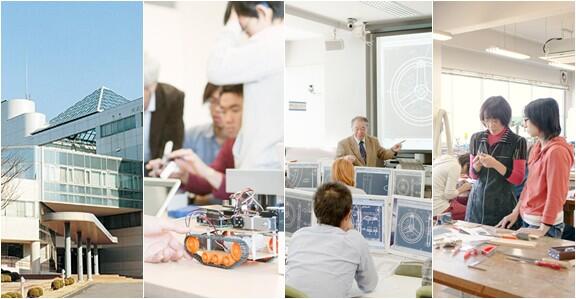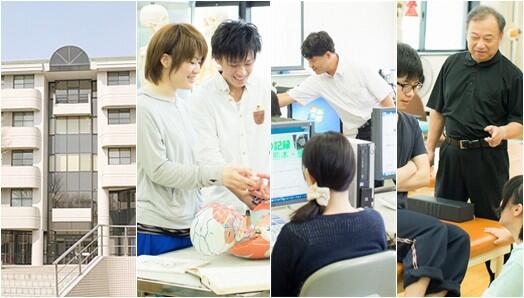Undergraduate Schools
Undergraduate Schools
Here we introduce the faculties, departments and courses of NTUT.
Faculty of Industrial Technology

As a higher education institution for people with Deaf and Hard of Hearing, professionals who can participate in society and contribute to social development are assisted through information processing, manufacturing, and the creation of living environments. Moreover, educational improvement is addressed through research in each special field and through the development of educational methods and equipment.
Department of Industrial Information
The Department of Industrial Information trains professionals who participate in and contribute to society through information science, mechanical engineering, architecture, and assistive technology studies. Students are nurtured to have a comprehensive and broad perspective on industrial technology through four courses: Information Science, Advanced Mechanical Engineering, Architecture, and Assistive Technology.
Course of Information Science and Engineering
The Course of Information Science and Engineering suggests three learning models focusing on data processing, software systems, and hardware, respectively, and provides flexible curriculums accordingly.
Course of Advanced Machinery Engineering
The Course of Advanced Machinery Engineering trains students in a wide range of expertise in mechanical engineering and four areas of mechanics (material, vibration, thermal, and fluid) rooted in the basics of mechanical engineering, in addition to computer-aided technology (CAD/CAM/CAE/CAT), which is essential for modern manufacturing.
Course of Architecture
The Course of Architecture trains students systematically and cross-sectionally in a group of subjects centering around architecture planning, structural engineering, environmental engineering, and architectural drawing to nurture professionals who participate in and contribute to a symbiotic society through the knowledge and technology of architecture acquired through the course.
Course of Assistive technology
The Course of Assistive technology consists of three areas of study (i, welfare equipment engineering, and welfare living environment studies) and provides flexible and cross-sectional curriculums accordingly.
Department of Synthetic Design
The Department of Synthetic Design provides two courses, the Creative Design Course and the Assistive Technology Course, to train students to have a comprehensive and broad perspective on design and to nurture human resources to participate in and contribute to society through design studies.
Course of Creative Design
The Course of Creative Design suggests three learning models focusing on information design, graphic design, and product design, respectively, and provides flexible curriculums accordingly.
Course of Assistive technology
The Course of Assistive technology provides a flexible and cross-sectional curriculum in the area of accessible design studies.
Faculty of Health Sciences

As a higher education institution for students with Blind and Low Vision, we nurture high-level medical specialists who can cope with changes in a flexible manner in a society where technical innovation, informatization, and globalization perpetually advance. We also train future experts in information technology who contribute to health and public welfare.
Department of Health
The Department of Health offers programs for students to improve their capability to compensate and conquer their visual disability. Students learn the rich humanity and the ability to cope with a variety of circumstances. It aims to foster excellent acupuncturists, as well as moxibustion, massage, acupressure, and physical therapists.
■Course in Acupuncture and Moxibustion
The Course in Acupuncture and Moxibustion provides training in the manipulative therapy of acupuncture and moxibustion, through which students can obtain the expert knowledge and skills necessary to become acupuncturists and therapists in moxibustion, massage, and acupressure. Specifically, students learn a high degree of professionalism from the viewpoint of both Oriental and Western medicine to allow them to contribute to modern medical care.
■Course in Physical Therapy
Students are trained to acquire advanced and specialized knowledge and skills of physical therapy to become physical therapists who take responsibility in the field of rehabilitation medicine. In particular, we emphasize individual guidance in practical subjects and clinical training, so that students can fully exert their practical skills. We also train students to become professional technicians who are highly sensible and educated as members of medical services, maintain good relationships with other people, and have an attitude to pursue medical services that truly benefits patients.
Department of Computer Science
Special attention is paid to students with Blined and Low Vision by ensuring access to computers with the aid of assistive technologies. Subjects and practices from diverse Information Technologies (IT) and business management areas are provided for students to become specialists in industry and in office environments.
Faculty of Diversity and Inclusion Studies
As a higher education institution for people with Deaf and Hard of Hearing and/or Blind and Low Vision, the Faculty of Diversity and Inclusion Studies aims to cultivate individuals with disabilities who can take a leading role in further promoting diversity and inclusion by acquiring knowledge in information science related to information accessibility, as well as sociological perspectives on the relationship between society and diverse minorities.
Department of Diversity and Inclusion Studies
■Program for Students with Visual Disabilities
■Program for Students with Hearing Disabilities
